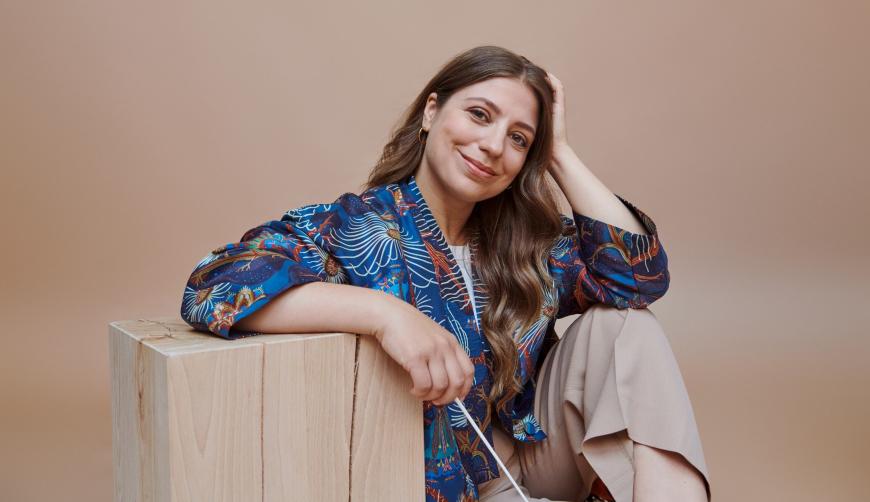
She was born in Kyiv, moved with her family to Finland via Estonia when she was 5, and became hooked on classical music at 12. Be assured, though, that Dalia Stasevska is not your mother’s conductor. Indeed, as chief conductor of Finland’s Lahti Symphony Orchestra and principal guest conductor of the BBC Symphony Orchestra — in 2019, she became the youngest person, and first woman, to be awarded that title — Stasevska, between gigs with prestigious ensembles that include The Philadelphia Orchestra, the Los Angeles Philharmonic, and the Orchestre National de France, has not only raised money for Ukraine but has also driven trucks filled with supplies to her native country since the Russian invasion began more than a year ago.
Whoever said that music and politics don’t mix hasn’t met the 38-year-old Stasevska, who originally trained as a violinist and composer at the Tampere Conservatoire and then studied violin, viola, and conducting at the Sibelius Academy. Now, she is making her debut with the San Francisco Symphony April 27–30 in a program of Anna Meredith’s Nautilus, which she led last summer at the Hollywood Bowl, and two works by Jean Sibelius.

Stasevska will also most likely give a speech before leading the band, wearing her activism on her silk-sleeved kimono, as she has been known to do. (During a 2022 concert in Seattle, Stasevska made a speech about the then-unfolding war in Ukraine before leading the ensemble in that country’s national anthem.) And her Instagram account is another way for her to bare her feelings about the war; she often uses the platform to urge her followers not to “look away,” not to “get tired of this war.”
That Stasevska is also married to Lauri Porra, a composer and bassist in the metal and jazz bands Stratovarius and Lauri Porra Flyover Band Ensemble, respectively, only adds to her multifaceted personality. And by the way, Porra, who also writes film scores and orchestral commissions, happens to be the great-grandson of the aforementioned Sibelius.
Talk about a marriage made in some kind of exotic musical heaven. And yes, Stasveska, who was given the Order of Princess Olga of the third degree by Ukrainian President Volodymyr Zelensky in 2020, as well as having been announced as 2023’s “Personality of the Year” by BBC Music Magazine, has conducted her husband’s music, notably with the Lahti Symphony, where she recently renewed her contract through spring 2025, as she did with the BBC Symphony, also through 2025.
SF Classical Voice had a chance to catch up with Stasveska by Zoom from Montreal, where she was readying for a performance with the Montreal Symphony Orchestra. Our conversation ranged from her activism to her profound feelings for Sibelius to falling in love with opera and orchestral music as a preteen.
Most 12-year-olds wouldn’t listen to Puccini, much less get intoxicated by his music. Yet when a school librarian lent you her recording of Madama Butterfly, you had an epiphany, and music became your life.
I’m forever grateful to that person. I can’t remember who she was, but she changed my life. It’s important [that] parents force you a little bit at the beginning to practice, but there comes always a point where you need to fall in love yourself with what you’re doing and your parents need to let go. This is the exact moment when you’re 12 — suddenly nobody needed to force me anymore because I fell in love myself with music.
This is a land I understand and can communicate in a way I feel deeply connected to. I remember Puccini, oh my god, this music — this is how I feel now. How is it possible that somebody has written such music for my emotions? This is the power of music. It’s like a private space and can mean different things to different people, and at that moment, the music could verbalize emotions I couldn’t verbalize as an early teen. This was such a big revelation for me and made me want to practice because I wanted to become a professional musician.
Your passion for music would also become, in a way, a platform for activism. Where did this come from?
Maybe because I come from a poor family, a family of immigrants, and saw [as] [a kid things that [weren’t] always so nice. I think that I felt a strong need, or I had a sense, a kind of feeling, [of] what is right and wrong, [of wanting to] defend people who are mistreated or not in the best positions and people [who are] taken advantage of.
I remember in school I was quite courageous. When I saw that someone was bullied, I always interfered. That was strong for me, always. In 2014, I became an activist when Russia annexed Crimea, part of Ukraine. It changed for me everything, and I became [a] quite vocal activist. But then, unfortunately, nobody was interested in hearing Ukrainian voices. But through this tragedy, this horrific, full-scale war, this invasion, finally now the world is listening to Ukrainian voices. I try to use every opportunity to speak out and do everything I can.

You’ve been described by the eminent flutist and educator Claire Chase as being “courageous on and off the podium.” Where does that courage come from?
It’s difficult to say. I don’t know — just be a human. Do the right thing. I don’t know how to answer, to be honest, but I always felt strongly that you have to be honest to who you are, and as a minority in my business, seeing this horrific situation in Ukraine, I feel there is no choice. You have to do the right thing — fight for equality, fight for human rights. There’s always somebody who wants to take it away.
To that end, you’ve raised more than $200,000 since the invasion began, in addition to driving supply-filled trucks into Ukraine. Do you plan on going back?
Yes, it will be in the summertime. Again, I will go with a relief load, and I will be conducting an orchestra there, INSO-Lviv [International Symphony Orchestra Lviv]. I conducted them a few times, and the cultural life is completely crippled there. People don’t get paid; you can’t have seasons.
But it’s so important for me to go there because nobody goes there, to stand next to them and show them I’m not afraid, to give hope. And I can bring this one orchestra to Finland, away from war, even for a few days. It’s something that is important.
Another orchestra you’ll soon be leading is the SF Symphony, with Joshua Bell soloing in Sibelius’s Violin Concerto. Have you worked with Bell before, and why that program?
I’ve been assistant in one concert where he was a soloist, and I have met him once. He’s my childhood violin idol. Now, to be able to work with him, it is really a dream come true. It’s almost difficult to believe, but I will enjoy the ride as much as I can.
Always when we program, it’s a collaboration with the orchestra, soloist, and me, of course, and we always lay out different possibilities we would like to do, and we try to match and make a nice narrative for the concert. This came together quite nicely and easily.

Ah, but Sibelius! Were you as interested in him before you married Lauri Porra, the great-grandson of Finland’s beloved composer?
Yes, I was interested in Sibelius. The family has nothing to do with this. I’m a musician on my own, and Sibelius has been an important part of my whole life — my musical life. It’s difficult to say when I heard him the first time; it felt like he was always there. I could say maybe he’s the closest composer to me, and it’s a very strong friendship for life for me.
He’s also one of those composers [that] every time I open the score, I have a childish excitement always returning to his music.
OK, so when and how did you meet Porra, and were you a “metalhead”?
I guess it’s not a secret. We met at 4:30 a.m. in McDonald’s in Finland in 2015. It was a complete coincidence. I think we were both returning from very wild parties. I had heard of his group, but I was not into heavy metal. In that sense, we didn’t know about each other.
Did you have, well, a few McMuffins together and exchange numbers? And when did you find out that he was related to Sibelius?
No. I think we were so drunk, [but] we had an instant connection, and he found me on Facebook the next day. I have to tell you, when we started dating, I didn’t know. It was three months after we dated. He had a small photo of Sibelius in his apartment, and I was thinking, “He likes good music.” A few months after our dating, I asked him, “Why do you have Sibelius’s photo on your wall?” and he said, “I’m actually his great-grandson, and there are more important things to think about.”
On the topic of greatness, why do you think Finland has produced so many enormously gifted musicians — from composers Kaija Saariaho and Sibelius to conductors Susanna Mälkki and Esa-Pekka Salonen? Is there something about the water, the climate?
It’s a good question. I think there are a few things to touch on this subject. One thing is that it connects to Sibelius actually and to [his] Second Symphony. Finland had been for hundreds of years under Sweden or the Russian Empire, and Finland as a nation is very young — only [just] over 100 years. We had this idea when we started to be born as a nation. It was built on culture — on music, literature, and painting — and Sibelius had a really important role in it.
Even though his music is not political — maybe Finlandia is the closest — he really put in [music] the emotions of people and the feelings that you couldn’t express under the Russian Empire. And the same thing with painters; they started to paint paintings that brought up the national identity, folklore. And the same thing with literature; we collected poetry and wrote down our stories.
Culture played a really important role, and it’s the basis on which Finland is born. When we find ourselves in these weird political discussions, we forget a nation is nothing without culture — it’s our past, present, and future. You can’t calculate [this] in money because its worth is so much more. Understanding the importance of culture has shown the way for our independence. [At the] forefront is equality, and [by] equality I mean our education system is for free for everybody. This means our government invests in everybody. No matter if you’re poor or rich, a man or woman, everybody has the same opportunity.
I came from a poor family. If I were living in the U.S., I would never have [had] the opportunity to play classical music. The [Finnish] government is investing in everybody, and everybody has the chance to use their potential. That’s why there are so many artists coming from Finland. As a small nation, we have been supportive of each other — musicians support composers, conductors support composers. It’s almost hilarious about this competition — who will find the next Saariaho, the next Sibelius?

And speaking of Russia, I understand it’s been difficult for you to perform music by Russian composers since the war began. How do you overcome that, and more importantly, how do you manage to remain hopeful?
It is for me difficult to conduct Russian music. It’s controversial because, especially dead composers, they’re not guilty of this situation at all. This is something we have to understand — it’s not their fault. But Russia is using culture as a soft power, and as a half Ukrainian [Stasevska’s mother is Lithuanian], for me it’s really difficult on a personal level to have to do anything with Russia or Russian culture.
My little brother is in Ukraine; it becomes really personal, [but] I am hopeful. Ukrainians give me hope. Their courageousness, it makes me cry to see how courageous these people are and how they sacrifice everything. That’s why I don’t lose hope. Ukrainians inspire me every day. It’s funny that sometimes, when I call my friends or relatives and I’m in panic or shock, they calm me down. “Dalia, it’s OK.” I keep fighting for the good to win over the evil. You have to keep hopeful, otherwise they will win.




